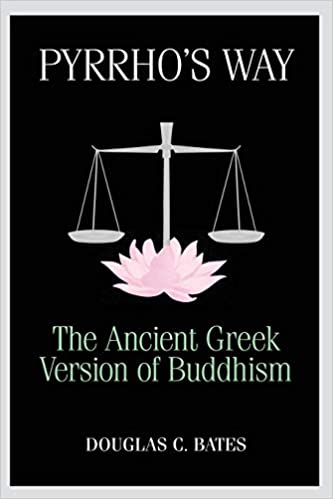| Home | |
| Overview | |
| Blog | |
| Discussion Group | |
| Glossary | |
| Buddhist To Pyrrhonist | |
| Buddhism | |
| 10 Modes | |
| 5 Modes | |
| Maxims | |
| Recommended Reading | |
| Contact |
Recommended ReadingEssential ReadingPyrrho's Way: The Ancient Greek Version of BuddhismPyrrho's Way: The Ancient Greek Version of Buddhism is the only modern introduction to Pyrrhonist practice, and the only book written for general readers.First four chapters, free online In Europe at:Amazon UK Amazon Spain Amazon Germany Amazon Netherlands Amazon France Amazon Italy Outlines of PyrrhonismThis book is available in three complete English translations and one partial translation. The quality of the translations differs markedly among them. Of the complete translations, the best is The Skeptic Way by Benson Mates. Mates was a scholar sympathetic to Pyrrhonism and who appears to have understood it well. The worst is Annas and Barnes' Outlines of Scepticism. They are hostile to Pyrrhonism, which they're open about in the introduction of their translation. They neither like nor appear to understand the text. The third translation, Outlines of Pyrrhonism, is by Robert Greg Bury. It's about 100 years old. Bury was a prolific translator of ancient Greek. He appears to have been a yeoman translator, but had no particular expertise or affinity for translating Pyrrhonist texts. The one partial translation is How to Keep an Open Mind: An Ancient Guide to Thinking Like a Skeptic by Richard Bett. This book contains selections of the work of Sextus Empiricus that are most relevant to modern readers, and the style of the translation aims to be particularly accessible to modern readers. In addition, the book is available as an audiobook. Unfortunately, in the introduction of the book the translator provides wildly erroneous interpretations of Pyrrhonism. Book IX of Lives of the Eminent Philosophers by Diogenes Laertius"Diogenes Laertius was, unfortunately, a hack writer, clumsily assembling text from a variety of sources without regard to the accuracy of those sources, his book is, alas, our best surviving ancient doxography of ancient philosophy. The traditional view of ancient philosophy is that Socrates was the pivotal figure and that philosophy is properly divied into pre-Socratic and post-Socratic thinking is correctly dispelled in Diogenes' doxography. Much of what is now labled as pre-Socratic philosophy should be viewed as non-Socratic. These are thinkers that Socrates (or at least Plato's character, Socrates) rejected. However, these philosopher continued to have followers long after Socrates, and continued to produce new philosophers in their lineages, the most important of these being Pyrrhonism and Epicureanism. Book IX of Lives of the Eminent PhilosophersAgainst the EthicistsThis book is available in two translations. One is by Richard Bett, who is an expert on ancient Pyrrhonism, and contains his fine commentary on the text. The other is a 100 year old translation by Robert Greg Bury. Additional Reading for BeginnersMartha Nussbaum describes the practices of all of the Hellenistic schools of philosophy in The Therapy of Desire: Theory and Practice in Hellenistic Ethics, producing a good overview. The key weaknesses in the book are that Nussbaum shows favoritism to the Peripatetics, she conflates the Pyrrhonists and the Academic Skeptics, and some readers find her long-winded. Advanced TextsThe rest of the surviving works of Sextus Empiricus are mostly detailed arguments against a variety of ancient dogmas which have nearly all since been abandoned. So, while history has demonstrated the accuracy of the Pyrrhonist critique of dogmatism, these texts are difficult for most modern readers as they cover so many obscure ideas. Of these, Against the Astrologers is the most accessible, as astrology continues to have proponents today. This particular text is also useful for dispelling a common misinterpretation of Pyrrhonism regarding falsification. Some people have inferred that because Pyrrhonism finds insufficient support to declare non-evidnet things to be true that it must also fail to find sufficient support to declare non-evideent thigns to be false. However, in Against the Astrologers Sextus makes it clear that the some of the dogmas of the astrologers simply cannot be true. Cicero's Academica, only part of which survives, is useful for its presentation of Academic Skepticism, which is similar to Pyrrhonism, except, primarily over the difference that the Academics argued that truth was unobtainable and that therefore one should assent to propositions that looked truth-like. Pyrrhonism & BuddhismFor those interested in the originations of Pyrrhonism from Buddhism, Christopher Beckwith's Greek Buddha: Pyrrho's Encounter with Early Buddhism in Central Asia is essential reading. The most important chapter is available free, online, from the publisher. For those interested in the connections between Madhymaka and Pyrrhonism, along with Pyrrhonism's influence on later thought, Adrian Kuzminski's Pyrrhonism: How the Greeks Reinvented Buddhism is the go-to text. The book also has an excellent discussion of the Pyrrhonist distinction between evident and non-evident in chapter 3. Stephen Batchelor has given several excellent talks on the relationship between Pyrrhonism and Buddhism. For those interested in how ideas were transmitted in the ancient world, most particularly the migration of ideas between East and West, Thomas McEvilley's The Shape of Ancient Thought: Comparative Studies in Greek and Indian Philosophies is essential reading. It briefly discusses some of the Pyrrhonist/Buddhist transmissions. For those with a deep interest the connections between Pyrrhonism and Madhymaka, Matthew Neale's unpublished dissertation which he summarized in this video Buddhist Philosophical SkepticismMany Buddhist works present philosophically skeptical views that have similarities with Pyrrhonism and which are inspirational for Pyrrhonist practice.
|
